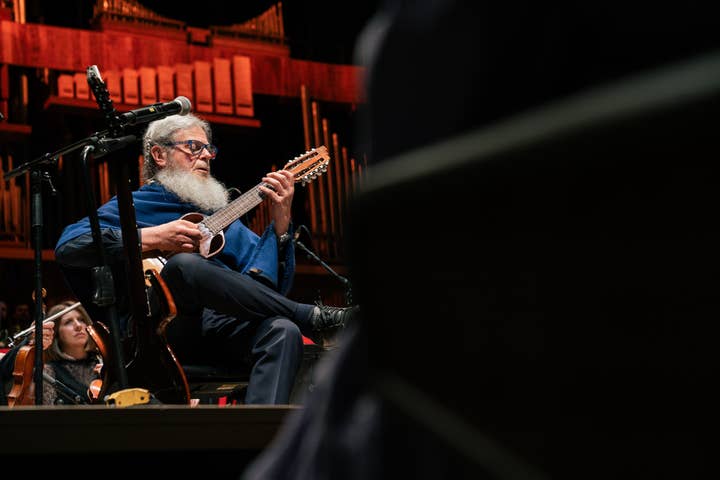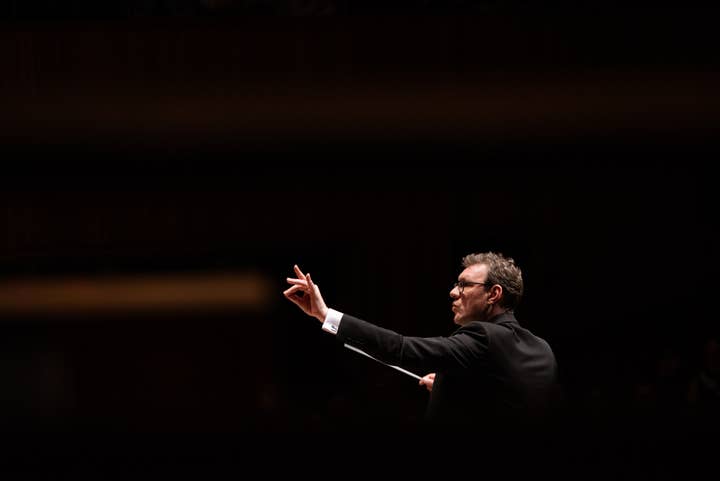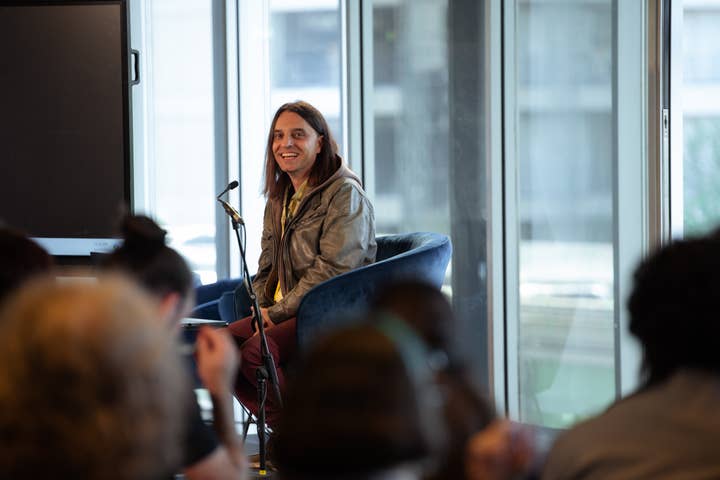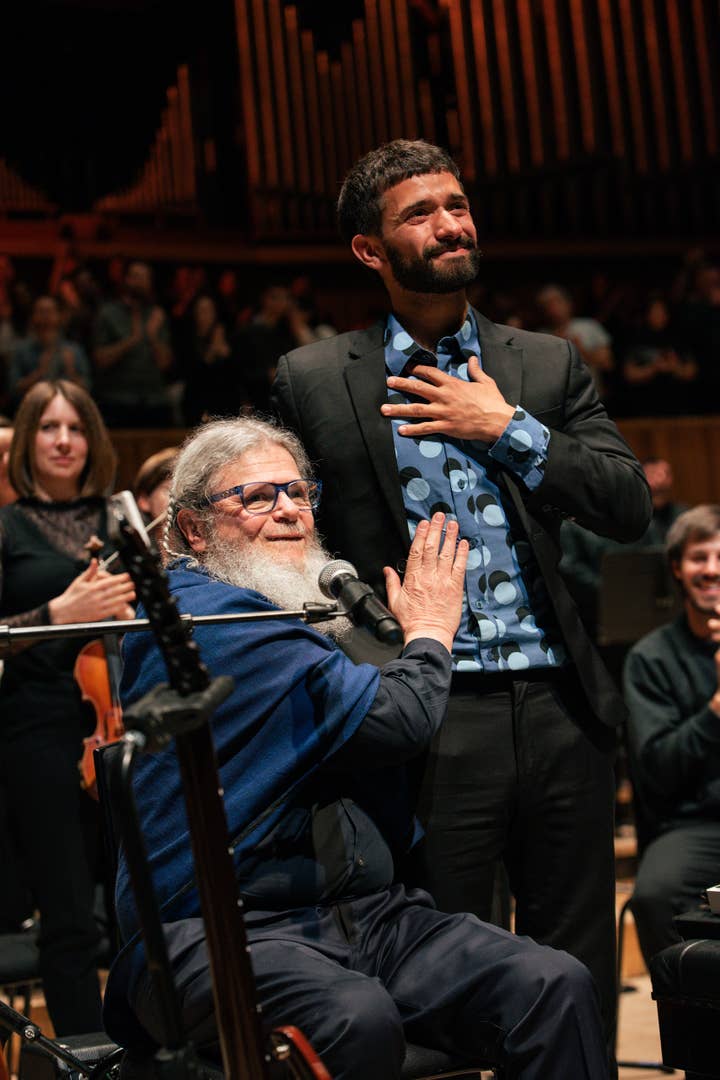From The Last of Us to Baldur's Gate 3: The success of the Game Music Festival
We talk to Borislav Slavov and Gustavo Santaolalla about the new golden age of games music
Two years ago, the Game Music Festival was held at London's Royal Festival Hall for the very first time, after five editions in its Polish homeland.
At the time, we noted how the venue, which can seat 2,700 people, was well attended, but not full. But the audience gave the two scores performed (Cuphead and both Ori titles) a very warm reception, and the event was undoubtedly a great success.
The Game Music Festival returned to London last Saturday, welcoming Larian's composer and music director Borislav Slavov for a concert presenting Baldur's Gate 3's music, and Oscar-winning Gustavo Santaolalla to perform The Last of Us' score. Both concerts featured the Philharmonia Orchestra and, in the case of BG3's performance, the Hertfordshire Chorus.
And the atmosphere was beyond anything we've previously witnessed at a games concert.
Santaolalla, one of the most revered film composers and musicians out there, was given a standing ovation before even playing a single note. His performance, changing instrument with almost every track alongside soloist and long-time collaborator Juan Luqui, explored every emotion, from tear-jerking instrumental pieces straight from TLOU's score, to electric songs from his repertoire extending that universe (if you've never listened to Ando Rodando, this is your sign to do so).
Later in the day, the Baldur's Gate 3 concert was filled to the brim, with the game's cast in the audience alongside many cosplayers, enjoying performances from solo soprani Ilona Ivanova and Mariya Anastasova on some of the game's iconic tracks, and the energy rising exponentially until a terrific finale that saw actor Andrew Wincott join Slavov on stage for a surprise performance of Raphael's Final Act.
"Some of those people will realise that this is something special, and this might ignite their curiosity for symphonic music"Borislav Slavov
The day also offered panels as well as masterclasses from both Slavov and Santaolalla. Securing both names for the Game Music Festival saw it sell out at the speed of light (BG3 in 24 hours, TLOU in a week); something that Mateusz Pawlak, founder of the Game Music Festival, told us he couldn't quite believe. The event is run by a handful of people, and it's their dedication and passion that convinced both artists to join the programme this year.
Before the concert in London, Santaolalla performed it in Poland, and he describes the show as a highlight of his career (which spans over 50 years), finding the audience's reaction "truly unbelievable."
Something very special happened at the Game Music Festival, then.
Slavov says the organisers are "some of the biggest ambassadors of video game music" and, having previously worked with them for a Divinity Original Sin 2 concert in 2020 (which also premiered BG3's score), he didn't think for too long before coming back.
"These guys are truly passionate about video game music, and that's very exciting for me. They bring [it] to a wide audience, to people who might not be familiar with those games. The music speaks a universal language. The moment they approached me, it was a no-brainer."
He continues: "When they invited me to join this edition of the festival in London, it was way before Baldur's Gate 3 turned out to be the hit it is today. The game was not released yet, we were in the middle of the [pandemic]. [They] were willing to put their trust and to put a bet on us, on Larian Studios and on Baldur's Gate 3. So you can imagine what it means for me and for us."
Slavov mentions the importance of events such as the Game Music Festival, which he considers a "true celebration of games and video game music."
"They [also] attract young audiences to the symphonic halls," he adds. "Audiences that would usually not try or give it a listen. Then some of those people will realise that this is something special, music they have never experienced before, and this might ignite their curiosity and their passion for symphonic music."
Santaolalla notes that this presents an interesting opportunity from a musician's perspective as well, as The Last of Us' music wasn't conceived with an orchestra in mind for instance. Working with Luqui and the orchestra, he says he tried to find a result that felt "organic."
"And also the relationship with the musicians... These are classical musicians, who are [working] with us and [they] are usually playing music that is probably much more complex than this. And yet, they really connected in a couple of days, because that's all we had! And I think that translated to the music too."
He enthuses about the recognition his music for The Last of Us achieved, and more generally what it means for the mainstream appeal of games music.
"The world of video games perhaps before wasn't paid that much attention to... I feel that video games in general now have a place in the world of entertainment that is huge, and that it didn't used to be like that," he says.
"And I think in some cases, particularly in this game, music plays an important role. One that has been instrumental to the success of the game, too, I think. I love that Craig Mazin [co-creator of the HBO adaptation] and Neil [Druckmann, president of Naughty Dog] said that my music is a part of the DNA of The Last of Us."

Slavov says video games music has reached a "very special" stage that he calls a "romantic period," with the music crossing boundaries beyond its core community.
"The moment where video game music crosses the border between the industry and media, and goes into everyday people's lives... This is very, very special and makes me incredibly grateful, and lucky to be able to witness [it], and to be part of [it]."
He adds: "And this is the proof and strongest indication that video game music is a thing in its own right. It's one thing to be part of the medium, as good as it is, but it's a completely different story when one day you realise that this particular element from the video game development is crossing the boundaries and becoming part of the people's everyday lives."
Slavov wants to fight against the common idea that film scores get more recognition than games music, saying the paradigm has now well and truly shifted.
"That's the [thing] that the film and game industries should pay attention [to]: the importance of the story, of great characters, all that; the human aspect. That's what people really connect [with]"
Gustavo Santaolalla
"More often nowadays, we witness video game soundtracks being right there at the top of the charts of soundtrack productions. I can tell you that the Baldur's Gate 3 soundtrack was at the top of Amazon, iTunes, months after its release, to the surprise of everyone including myself! And when I say charts I don't mean the video game music charts, I'm talking about film, musical, every single soundtrack production out there."
He continues: "I receive hundreds of messages every single day from people who are telling me that they are [listening] to the music. I recently got a novel by an author and they were telling me that they were they would listen to the soundtrack while they were writing the book. Or I would get pictures from people's wedding ceremonies where they selected specific songs from the soundtrack. Or somebody was driving a long way home and would drop me a message that the music would keep their spirits high.
"So, it's truly mind-blowing and absolutely overwhelming, and if this is not an indication of that crossing of boundaries, then I don't know what is. That's the most special thing and ultimate proof that video game music is there."
Towards the end of 2023, Slavov had expressed on social media that he felt that we were "witnessing a true renaissance of video game music." Games concerts now regularly move crowds even outside of big names like Final Fantasy, one example of an established brand when it comes to live game music.
"Maybe 'renaissance' was not the best word to describe it, but rather I meant exactly this crossing of boundaries; boldly, not accidentally and randomly. Because it was happening even ten years ago. But nowadays it's everywhere, all the time: we're witnessing it.
"Would you have thought ten years ago that a video game concert would be sold out in a single day for the Royal Festival Hall?"

Both Slavov and Santaolalla agree that the emotional connection is the most important aspect of composing for games, and the reason why it resonates with people so widely.
Santaolalla got interested in the games industry because he enjoyed watching his son play, he tells us. But it's the prospect of that emotional connection that drew him in.
"I always thought, watching him play: if somebody connects in an emotional way with the game, it changes the whole thing," he explains.
"And after the two Oscars, I was approached by different people to do some video games and got some big offers, not only in terms of money but in terms of exposure and connection with these big companies. I always like to say that whatever success I have achieved has to do not only with stuff that I've done but also stuff that I've said no to. And I said no to a whole bunch of things!
"And actually, when I met Neil, it was like: this is it. This is what I want to do. And he also manifested to me that he was looking for that connection. And then when we learnt that people were crying [while] playing the game, it was a confirmation that we were doing something that was connecting with people.
"I always like to say that whatever success I have achieved has to do not only with stuff that I've done but also stuff that I've said no to"Gustavo Santaolalla
"For me music is really truly about emotion. That's what I always try to convey in what I do. And I use all sorts of elements and things that have to do with the way I write, the use of silence, the use of textures, and the use of right notes disguised as wrong notes. And that's all really truly to generate a deep emotion."
Slavov is in agreement, mentioning that special connection you feel with role-playing games in particular, where you put so much of yourself into the character you're playing, with the music accompanying you every step of the way.
"The decisions you made, the result of those decisions, and the emotions that went through your heart: you would instantly connect those exciting moments, [those] emotions you experienced, with the music that was playing at the same time. And the best way to re-live and to remember those emotional moments in your life – because they are part of your life now – would be to go back and listen to the same piece of music.
"Those are equally important moments and memories of your own life. And that's why I say that we are there," he says, talking again about the rise of games music popularity. "And we just need time for other people to realise and to accept it because it takes some time for the people to embrace it, and start actively become part of popularising it."

The importance of that emotional connection starts from the very beginning of the project, with both composers saying that if they don't feel anything working on a score, they can't expect listeners to catch on the emotion.
"Most of the films that I've done, 70% or 80% of the music was done prior to [seeing] anything [from] the film," Santaolalla says. "Themes, motives, leitmotivs, the sonic fabric, all that has been decided prior."
"The moment where video game music crosses the border between the industry and media, and goes into everyday people's lives... This is very special and makes me incredibly grateful"Borislav Slavov
He says he composed all of Brokeback Mountain, for which he won an Oscar in 2006, without seeing a single shot. His approach was the same for The Last of Us, he says, because what matters to the process is not the medium but the story and how he connects with it.
"The Last Of Us, I never felt, for example, that I was writing music for a video game. I never felt that. I always felt that I was writing music for a great story, for a story that could be a series on HBO, an animation, or puppet theatre," he laughs. "Anything. Because it's a great story. And I think that's the [thing] that the film and game industries should pay attention [to]: the importance of the story, of the creation of a great narrative, of great characters, all that; the human aspect. That's what people really, really connect [with]."
When asked what advice he'd give to composers just entering the industry, Santaolalla says there's three things: developing a strong discipline of work, finding your own voice and identity, and then sticking to it.

"You'll find things that lots of people say 'Well, I'll do this now, but then I'm gonna do really what I want to do'... And I understand, because obviously you have to make a living for yourself, but I'd rather do something else to earn a living and keep my music or what I'm creating or developing intact, than just start to do something that has to do with what you want to do but is different.
"I see that as going out of a freeway at the wrong exit, and then not finding the entrance again. And then obviously, you're really getting late to wherever you were going."
This connects with Slavov's experience in an interesting way, with BG3's success being a milestone moment for him, giving him reassurance on his vision, confirming that he did take the right exit on the freeway.
"It's a constant battle, you know, you keep asking yourself: is this the right thing to do? Are you doing it the right way? Is this the right direction? Do you have the endurance, the stamina and the confidence to keep going and to live up to your vision? Those are questions that I wake up and go to bed with," Slavov says.
"Moments like this one, the biggest reward from my perspective, is that gives me the confidence that I was on the right track. Which would mean that now more than ever, I will boldly keep walking towards the same vision and direction that is there in my heart. And next time, I will just go bigger, crazier, and wilder. So that's the biggest impact [of success] for me."
"Production values are not always the most important thing, as long as it touches your soul... I just want to be moved. I just want to be inspired"Borislav Slavov
Concluding our chat, we ask Santaolla and Slavov if they see any particular obstacles for composers going forward.
"I think it's very much related to finding your own voice because now with artificial intelligence more than ever it's so important [to think] about what really you are going to bring that is going to make a difference," Santaolalla says. "What is going to have that imprint that is going to make your stuff?"
Slavov, however, says he can't think of particular obstacles, saying that game composers are currently in a very lucky position.
"Video game composers are a very special breed, and they enjoy the creative freedom that they have at the moment. And that's why I think that we are witnessing so many beautiful and interesting soundtrack productions in video games nowadays.
"Maybe not all of them are at the same level when it comes to production values. But at the same time, I believe that production values are not always the most important thing, as long as it touches your soul, as long as it makes your eyes wet, I don't really need it to be polished to death. I just want to be moved. I just want to be excited. I just want to be inspired."

